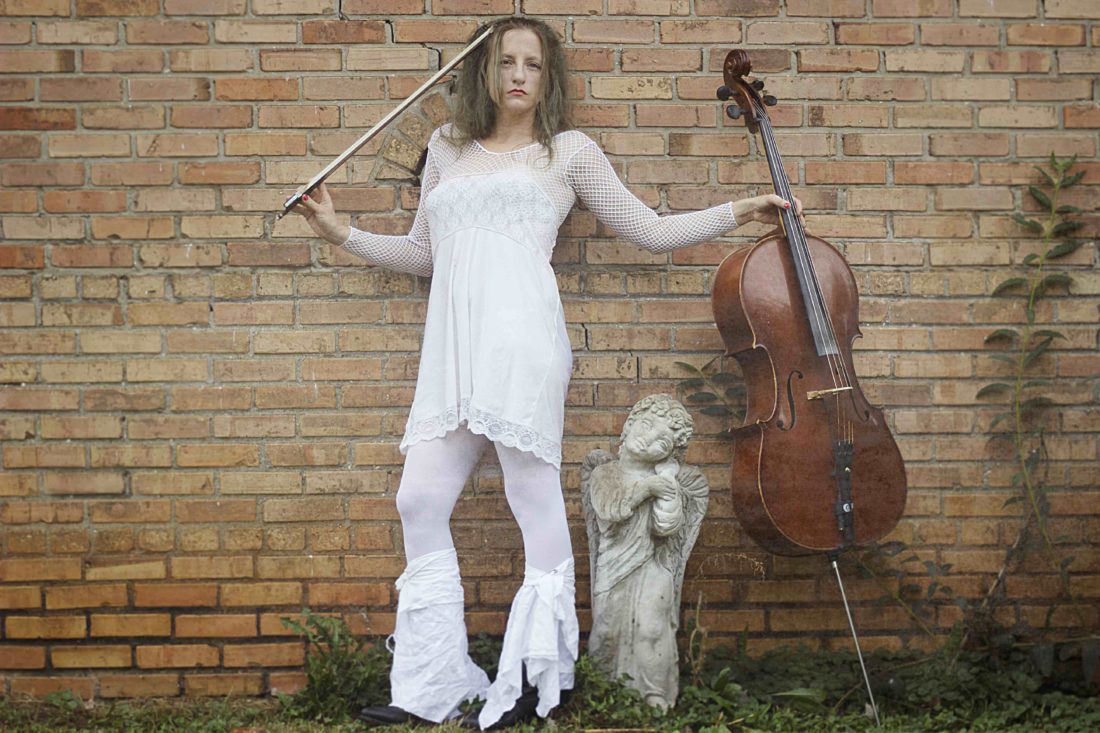Onstage, Polly Panic — aka Asheville-based musician Jenette Mackie — is dark and serious, sawing through a rock melody on her cello with equal parts artistry and precision, pulling her chunky, well-composed instrumentals into places that your standard electric guitarist can only access with distortion pedals. And though she looks and sounds rock ‘n’ roll, the instrumentation is almost entirely acoustic and remarkably stripped-down: Poet and drummer Caleb Beissert is her only bandmate.
The duo will bring their eclectic brand of cello-punk to Fleetwood’s on Thursday, Nov. 15 — an event that will launch their new album, Losing Form, and its accompanying tour.
Born and raised in Winston-Salem, Mackie first discovered the cello at age 16 when she watched Schindler’s List. “That instrument goes front and center in a lot of his painful scenes,” she says, “and that made me fall in love with it. I was a troubled teenager, so [cello became] my lifesaver, [something] to hang onto and focus on.”
Mackie’s career has spanned a handful of albums — including Losing Form, which is as raw, authentic and honest as the musician comes across in real life. She has also toured as a member of Brooklyn-based cello-rock collective Rasputina and gave birth earlier this year to a son, who is a constant source of both exhaustion and exhilaration.
The road to this juncture has not been an easy one.
Mackie’s first cello was a hand-me-down from a friend who took the time to show her the basics. When another friend enrolled in a photography program at the Rochester Institute of Technology in western New York, Mackie tagged along. After two years studying music at a community college, she enrolled in the Crane School of Music at SUNY Potsdam.
“Between obsession and, I guess, natural ability,” she explains, “I ended up in school with people who had been playing since they were 6, 7 — their entire lives. The learning curve was straight up the wall. Music school was tough, but I survived.” She was determined to sharpen her chops so that she could accompany herself on the songs she was beginning to write.
But even with a canon of original songs she was eager to perform, Mackie knew she would never have the courage to be as open onstage as rock ‘n’ roll demands unless she came up with an alternative persona for the stage. Enter Polly Panic.
Mackie had rescued a great Dane named Polly who, despite its size, would cower from people. “She was broken when I got her,” Mackie remembers. “It’s really cool to watch animals like that [have] the life come back into them.” During the time that she was trying to nail down her onstage persona, Mackie read Sylvia Plath’s short story Johnny Panic and the Bible of Dreams, about a woman who is slowly losing her mind.
Mackie liked the dichotomy of existential crisis that the name Polly Panic scared up — the dueling paths of losing one’s grip and regaining it. She felt the persona perfectly encapsulated the songs she was writing. She also appreciated the punchy alliteration of the name, the way it evoked something at once dark and playful, just like her music.
For years, she performed as Polly Panic, spiraling into a woefully unhealthy relationship with alcohol that turned so much of her early gigs into a total fog. For example, there was a guitarist in the band for a few weeks — a fact she only recalls now because there are pictures. It got that bad.
After a while, Mackie knew it was time to stop drinking and figured the only way to do that was to quit performing altogether. “I didn’t think you could have performing in bars without alcohol,” she says. “So [I decided] I had to quit Polly Panic to stay sober.”
As luck would have it, almost out of the blue, a friend who was living and working in Ecuador invited her down, and she leaped at the opportunity.
“I was trying to run away,” she admits. “I had never traveled anywhere to a new culture. I went to visit for a few days. It seemed like Lala Land — the quaint village, the gentle, positive people. I found out that nowhere is Lala Land. Some people are gently and kindly taking your wallet out of your back pocket.”
Though she met disillusionment yet again, the trip did serve as a bit of a wake-up call. Despite her intention to distance herself from music, she’d brought her cello and wound up playing in small cafes. The audiences were appreciative, mostly for the fact that Mackie was doing something they’d never seen done before.
“Here’s this crazy gringa doing whatever she’s doing,” she says. “So I had the most attentive audiences I’ve ever had. It was great. It showed me that I could do anything a lot better than I would have [drunk].”
It gave Mackie the confidence to return to the States and to music as Polly Panic. In Plath’s words, she had an “unfinished feeling” and decided that if she was going to sit in her room, playing and singing for the walls, she may as well take the music back to the stage where she truly belonged.
WHO: Polly Panic with Lung and Okapi
WHERE: Fleetwood’s, 496 Haywood Road, fleetwoodsonhaywood.com
WHEN: Thursday, Nov. 15, 8 p.m. $5






Cool outfit.